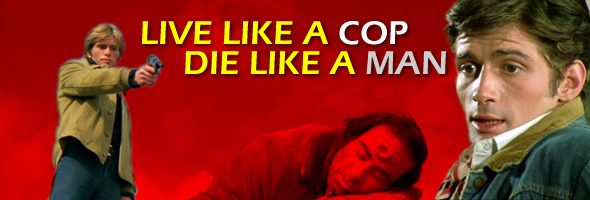
Color, 1976, 95m.
Directed by Ruggero Deodato
Starring Marc Porel, Ray Lovelock, Adolfo Celi, Franco Citti, Siliva Dionisio, Renato Salvatori
Raro (DVD) (US R0 NTSC)/ WS (1.85:1) (16:9), Raro (Italy R0 PAL) / WS (1.85:1)

Color, 1976, 95m.
Directed by Ruggero Deodato
Starring Marc Porel, Ray Lovelock, Adolfo Celi, Franco Citti, Siliva Dionisio, Renato Salvatori
Raro (DVD) (US R0 NTSC)/ WS (1.85:1) (16:9), Raro (Italy R0 PAL) / WS (1.85:1)
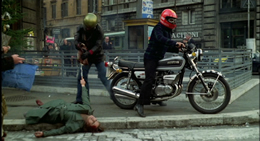 Italian cop movies during the '70s produced some insanely violent cult classics, and one of the maddest, Live Like a Cop, Die Like a Man, was never even given a chance outside its native country in heavily cut form for years. Though he'd started his career doing a few routine action and costume film in the '60s, director Ruggero Deodato took a lengthy time out for the first half of the '70s to focus on TV commercials and episodes. The experience obviously triggered something in his psyche, since he returned to filmmaking with far more ferocity, first with the bizarre erotic film Waves of LUst and then this psychotic look at a pair of cops who might be more dangerous than the criminals they're pursuing. Of course, after this there was no stopping Deodato as he plunged into even more sadistic waters with Jungle Holocaust, House on the Edge of the Park, Cut and Run, and his most notorious film of all, Cannibal Holocaust.
Italian cop movies during the '70s produced some insanely violent cult classics, and one of the maddest, Live Like a Cop, Die Like a Man, was never even given a chance outside its native country in heavily cut form for years. Though he'd started his career doing a few routine action and costume film in the '60s, director Ruggero Deodato took a lengthy time out for the first half of the '70s to focus on TV commercials and episodes. The experience obviously triggered something in his psyche, since he returned to filmmaking with far more ferocity, first with the bizarre erotic film Waves of LUst and then this psychotic look at a pair of cops who might be more dangerous than the criminals they're pursuing. Of course, after this there was no stopping Deodato as he plunged into even more sadistic waters with Jungle Holocaust, House on the Edge of the Park, Cut and Run, and his most notorious film of all, Cannibal Holocaust.
The action starts when a pair of purse snatchers drag their latest female victim's head against the pavement during rush hour in Rome, triggering the attention of cops Fred (The Psychic's Porel) and Tony (The Living Dead of Manchester Morgue's Lovelock), members of a "special squad" devoted to extreme measures against violent criminals. Fred and Tony pursue their targets on motorcycles in a jaw-dropping chase across the city, up and down steps, into storefronts, through cafes, and finally into a truckyard. It's hard to imagine the film could possibly top this opening (easily one of the best motorcycle scenes in movie history), but the rest of the film tries its best with a succession of brutal set pieces as the two cops, under orders from their possibly immoral boss (Thunderball's Celi), set their sights on a gangster named Bibi (Salvatori) and his thugs. In the meantime they sexually harass their secretary, tag team Bibi's daughter, and brutalize a string of other lawbreakers, in one case even gunning them down before they've actually carried out their planned bank robbery. Naturally, it all ends in a violent gun battle that leaves plenty of bodies in its wake.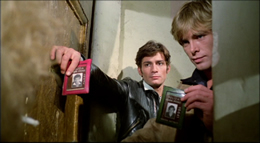
Sporting enough extreme violence to qualify as a parody of right-wing crime films like Dirty Harry and Death Wish, this twisted offering gets a lot of mileage out of the appealing presence of its leading men and the sheer outrageousness of their behavior, whether snapping necks, setting evildoers ablaze in an auto yard, or showing off the most eye-punishing underwear in '70s cinema. Though he would die seven years later after fighting many personal problems, Porel has one of his best roles here and displays an unsettling charisma rarely shown elsewhere; the genial Lovelock also matches him every step of the way, and both carry out their action scenes with a lot of energy and panache (not to mention some exceptional stuntmen who look an awful lot like them). As usual for the time, Lovelock also croons a couple of folk songs on the soundtrack, a second duty he also performed on 1970's wonderful and sadly neglected Queens of Evil and repeated again two years later for Last House on the Beach. His odd, Italian-style homages to Bob Dylan certainly aren't to all listeners' taste, but for many Eurocult fans, it's weirdly endearing whenever his voice starts warbling away. Significantly, 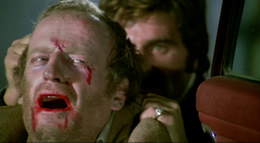 the screenplay was written by Fernando Di Leo, who was far better known as a director of numerous Italian cop films also released by Raro as a DVD box set. For some reason Di Leo was moving away from cop films by this period, which might explain why this wound up in Deodato's lap instead; the same year Di Leo directed the mob film Rulers of the City and then began work on one of the most shocking sexploitation films of all time, To Be Twenty.
the screenplay was written by Fernando Di Leo, who was far better known as a director of numerous Italian cop films also released by Raro as a DVD box set. For some reason Di Leo was moving away from cop films by this period, which might explain why this wound up in Deodato's lap instead; the same year Di Leo directed the mob film Rulers of the City and then began work on one of the most shocking sexploitation films of all time, To Be Twenty.
Unavailable in any format for years, this film made its inaugural DVD appearance from Raro in Italy with one major selling point (the restoration of several snippets of blood cut by Italian censors) and a host of problems; the non-anamorphic 1.85:1 transfer was obviously soft and below par even early in the format's history, and worst of all, the English audio track was only present in the left audio channel! It took many years to get things right, but their 2011 American edition is a substantial upgrade in every respect; the HD anamorphic transfer is much crisper and more satisfying, with more detail visible throughout and signficantly richer color reproduction. The English audio is also presented in correct mono at last, too. The mono Italian track is included as well with optional English subtitles (directly translated from the Italian track, not dubtitles), and it's fascinating to compare the two. Much of the film appears to have been performed in Italian (most obviously Celi's character), but some actors are 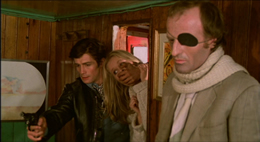 wildly out of synch in both versions and were probably just reciting gibberish or completely different lines on the set. Overall the Italian track wins out since it seems more genuine most of the time, while the English dub is all over the place; however, it does have a certain retro kind of vibe if that's what you're after. The shoddiness of this dub may also be a major reason why the film was never theatrically picked up in America, if the graphic violence weren't enough already.
wildly out of synch in both versions and were probably just reciting gibberish or completely different lines on the set. Overall the Italian track wins out since it seems more genuine most of the time, while the English dub is all over the place; however, it does have a certain retro kind of vibe if that's what you're after. The shoddiness of this dub may also be a major reason why the film was never theatrically picked up in America, if the graphic violence weren't enough already.
The main extra on this release is "Poliziotti Violenti," a 42-minute featurette with Deodato, Lovelock, and actor Al Cliver (who acted in Waves of Lust and was originally slated for this film) talking in great detail about its creation. Deodato speaks fondly of being given free rein with the project and shooting the opening chase scene in the city streets without permission (often running and hiding from the police), while Lovelock focuses on his relationship with fellow actors and his joy at getting to sing as well. Both of them share amusing anecdotes about the scenes with both actors riding on the same motorcycle, with Porel usually blocking Lovelock's head from view-- perhaps deliberately, perhaps not. Also included is a sample of Deodato's TV commercial work from a year or two before (with optional commentary), along with a liner notes booklet containing a one-page overview of the film (calling House on the Edge of the Park a "satire") and a Deodato bio/filmography.
![]()